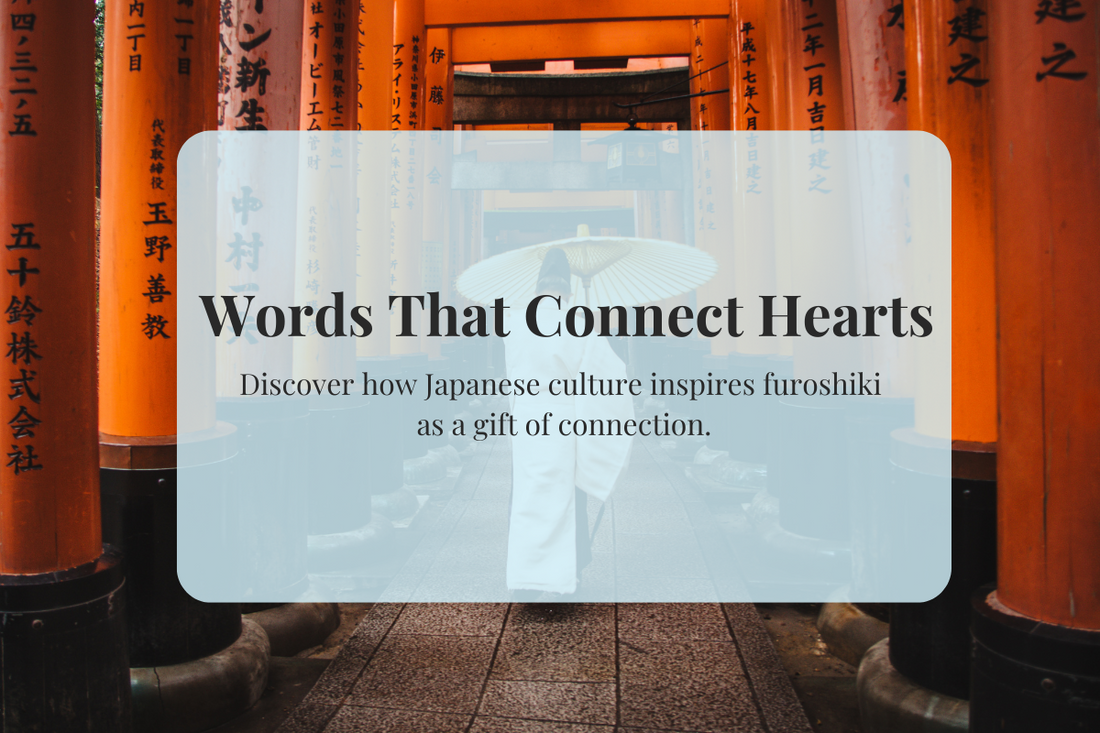
The Power of Words in Japanese Culture
Words shape how we connect with each other. In Japan, language is often treated with special care, carrying not only meaning but also a sense of respect and harmony. By looking at how words are used in Japan and comparing them with Western ways of expression, we can better understand the cultural background behind the furoshiki—a traditional wrapping cloth that represents thoughtfulness and connection.
The Spirit of Words in Japan
In Japan, words have long been believed to carry a special power. This idea is called kotodama, the spirit of words. Ritual prayers (norito) and traditional poems (waka) are classic examples. People believed that speaking good words would invite good fortune, while negative words could bring misfortune.
This belief has shaped not only rituals but also daily life. Through wordplay, numbers, and customs, people have found ways to express care and consideration for others.
The Subtle Art of Words
Japanese proverbs and traditions are often rooted in sensitivity to language. One example is the saying, “Do not let your daughter-in-law eat autumn eggplants.” At first it may sound harsh, but it has also been interpreted as thoughtful advice: autumn eggplants are delicious but can cool the body, so the saying suggests protecting the daughter-in-law’s health.
Numbers also carry symbolic meaning. Four (shi) is avoided because it sounds like “death,” and nine (ku) because it sounds like “suffering.” By contrast, eight (hachi) is considered lucky because its shape suggests growth and prosperity.
Seasonal traditions show the same mindset. Chitose-ame (“thousand-year candy”) given to children at Shichi-Go-San symbolizes a wish for long life. The round shape of kagami-mochi (New Year rice cakes) represents harmony. Wedding gifts like dried bonito (katsuobushi) and kelp (konbu) are chosen because their names sound like “victorious man” and “joy.”
This practice of attaching meaning to words and objects is known as kibutsu chinshi. It reflects how Japanese people have long embedded feelings and wishes into daily life.
How Words Are Used in the West
In English-speaking cultures, there are also powerful words, often called swear words. The most famous is the “F-word.” It’s often used to express anger or frustration, but sometimes also surprise or strong emphasis. Among friends, it can even have a positive nuance, as in “That’s f***ing cool.”
Japanese has strong words too, like baka (“fool”) or aho (“idiot”), but they don’t carry quite the same weight. In Japan, the issue is less about the word itself and more about whether it fits the situation or shows respect.
A Culture of Consideration vs. a Culture of Expression
Both Japan and the West value thoughtfulness, but they express it differently.
In Japan, harmony (wa) is central. Words are chosen carefully to avoid discomfort, and auspicious expressions are used to wish for someone’s happiness. Avoiding “unlucky” words at weddings or funerals is one example.
In the West, words are often used as direct expressions of emotion. Strong language can show honesty, passion, or intensity, and speaking openly is seen as a sign of authenticity.
This doesn’t mean Western cultures lack kindness. On the contrary, thoughtfulness is shown in many ways—through meaningful gifts, chivalry, or caring for children and expectant mothers. The difference lies in emphasis: in the West, kindness is often grounded in respect for individuals, while in Japan it is often grounded in maintaining group harmony.
The Meaning of Furoshiki
The furoshiki is a traditional Japanese wrapping cloth used to wrap, carry, and protect gifts. By wrapping, you show respect. By tying, you connect hearts. By unfolding, you create new beginnings.
The Japanese way of choosing words is much like the use of a furoshiki. Words can wrap feelings, tie relationships, and sometimes open up new connections.
At Musubism, we see the furoshiki as “a gift that connects hearts.” Each design is created with this cultural background in mind, so when you wrap something with our furoshiki, you’re also wrapping thoughtfulness and care. We hope the furoshiki will be seen as more than just a piece of cloth, but as a meaningful gift that carries connection across cultures.
We hope this inspires you to see the furoshiki as not only a practical item, but also as a thoughtful way to connect heart to heart across cultures.
